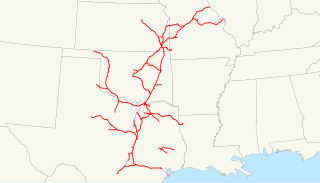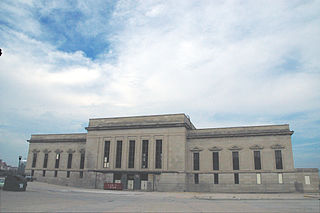Related Research Articles

The Kansas City Southern Railway Company was an American Class I railroad. Founded in 1887, it operates in 10 Midwestern and Southeastern U.S. states: Illinois, Missouri, Kansas, Oklahoma, Arkansas, Tennessee, Alabama, Mississippi, Louisiana and Texas. KCS owns the shortest north-south rail route between Kansas City, Missouri, and several key ports along the Gulf of Mexico.

The original Chicago, Rock Island and Pacific Railroad was an American Class I railroad. It was also known as the Rock Island Line, or, in its final years, The Rock.

Kansas City Southern (KCS) was a transportation holding company with railroad investments in the United States, Mexico, and Panama and operated from 1887 to 2023. The KCS rail network included about 7,299 miles (11,747 km) of track in the U.S. and Mexico.

The Missouri–Kansas–Texas Railroad was a Class I railroad company in the United States, with its last headquarters in Dallas, Texas. Established in 1865 under the name Union Pacific Railroad (UP), Southern Branch, it came to serve an extensive rail network in Texas, Oklahoma, Kansas, and Missouri. In 1988, it merged with the Missouri Pacific Railroad; today, it is part of UP.

The Missouri Pacific Railroad, commonly abbreviated as MoPac, was one of the first railroads in the United States west of the Mississippi River. MoPac was a Class I railroad growing from dozens of predecessors and mergers. In 1967, the railroad operated 9,041 miles of road and 13,318 miles of track, not including DK&S, NO&LC, T&P, and its subsidiaries C&EI and Missouri-Illinois.

The St. Louis–San Francisco Railway, commonly known as the "Frisco", was a railroad that operated in the Midwest and South Central United States from 1876 to November 21, 1980. At the end of 1970, it operated 4,547 miles (7,318 km) of road on 6,574 miles (10,580 km) of track, not including subsidiaries Quanah, Acme and Pacific Railway and the Alabama, Tennessee and Northern Railroad; that year, it reported 12,795 million ton-miles of revenue freight and no passengers. In 1980 it was purchased by and absorbed into the Burlington Northern Railroad. Despite its name, it never came close to San Francisco.

The St. Louis Southwestern Railway Company, known by its nickname of "The Cotton Belt Route" or simply "Cotton Belt", was a Class I railroad that operated between St. Louis, Missouri, and various points in the U.S. states of Arkansas, Tennessee, Louisiana, and Texas from 1891 to 1980, when the system added the Rock Island's Golden State Route and operations in Kansas, Oklahoma, and New Mexico. The Cotton Belt operated as a Southern Pacific subsidiary from 1932 until 1992, when its operation was assumed by Southern Pacific Transportation Company.

An air-line railroad was a railroad that was relatively straight, following a shorter route instead of a longer, winding route. In their heyday, which was prior to aviation, they were often referred to simply as "air lines".
Stuart R. Knott was the fourth president of Kansas City Southern Railway.

The Alton Railroad was the final name of a railroad linking Chicago to Alton, Illinois; St. Louis, Missouri; and Kansas City, Missouri. Its predecessor, the Chicago and Alton Railroad, was purchased by the Baltimore and Ohio Railroad in 1931 and was controlled until 1942 when the Alton was released to the courts. On May 31, 1947, the Alton Railroad was merged into the Gulf, Mobile and Ohio Railroad. Jacob Bunn had been one of the founding reorganizers of the Chicago & Alton Railroad Company during the 1860s.

Arthur Edward Stilwell was the founder of the Kansas City, Pittsburg and Gulf Railroad, predecessor to the Kansas City Southern Railway. He served as KCPG's president from 1897 to 1900. He was also the founder of Port Arthur, Texas.

Railroads in Omaha, Nebraska, have been integral to the growth and development of the city, the state of Nebraska, the Western United States and the entire United States. The convergence of many railroad forces upon the city was by happenstance and synergy, as none of the Omaha leaders had a comprehensive strategy for bringing railroads to the city.

The Pencoyd Railroad Bridge is a former railroad bridge in Kansas City, Missouri, that was converted into the Freight House Pedestrian Bridge and moved to its new location where it connects Union Station and the Crossroads Arts District.

The Wabash Railroad was a Class I railroad that operated in the mid-central United States. It served a large area, including track in the states of Ohio, Indiana, Illinois, Iowa, Michigan, and Missouri and the province of Ontario. Its primary connections included Chicago, Illinois; Kansas City, Missouri; Detroit, Michigan; Buffalo, New York; St. Louis, Missouri; and Toledo, Ohio.
References
- ↑ "Collection: Records of the Kansas City Suburban Belt Railroad Company | Kenneth Spencer Research Library Archival Collections".
- ↑ "Stuart Knott Appointed a Receiver". The Courier-Journal. Louisville, Kentucky. September 7, 1900. p. 3 – via Newspapers.com.
